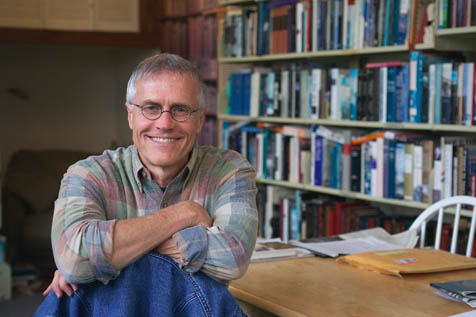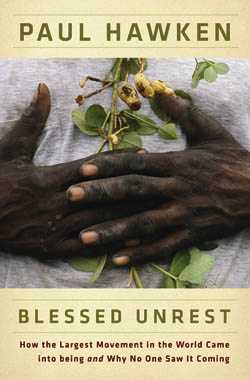Paul Hawken Speaks about Social Change
The New Global Movement

Environmentalist, journalist, sustainable business pioneer, and spokesperson Paul Hawken is one of the founders of the Natural Capital Institute (NCI), an organization dedicated to creating platforms and networks for those in the business of social and environmental change. Hawken is also the author of a number of bestselling and influential books, including The Ecology of Commerce and Natural Capitalism: Creating the Next Industrial Revolution. As the titles suggest, he’s a vocal proponent of the concept that businesses can act as environmental pioneers, creating an ecologically sustainable future through socially responsible commerce.
Hawken’s newly released book, Blessed Unrest: How the Largest Movement in the World Came into Being and Why No One Saw It Coming, describes what he considers the most significant social movement in humankind’s history: The current global effort by individuals and groups to create social justice and environmental sustainability in the way we live-in our homes, businesses, farms, and institutions. In our current climate, where headlines forecast disaster daily, Hawken maintains a surprisingly optimistic outlook. “I believe,” he states in Blessed Unrest, “this movement will prevail.”

This is not blind enthusiasm, but confidence born from examining the work of environmental activists worldwide. What appears at first glance to be a diffuse gathering of people with differing agendas are people and organizations linked by the common goals of sustainability and social change. During the course of the past decade, Hawken has documented this movement extensively, under the auspices of the aforementioned NCI. It is a movement, Hawken insists, that does not rest.
Users logging onto NCI’swiserearth.org will find information on more than 100,000 (yes, 100,000) organizations all striving to create positive change in the world, largely employing grassroots, community-action strategies. A scan down the list reveals that many of the featured organizations are located far from the U.S.: Uzbekistan, the Lao People’s Democratic Republic, and Kancheepuram, India, to name a few. American organizations range from interfaith groups whose efforts are focused on reducing emissions, to farmers and scientists involved in vegetable research for the purpose of reducing malnutrition and poverty. WiserEarth’s user-driven database is a means for people involved in building sustainable economies and rectifying social and environmental justice issues to engage in the type of social and business networking made possible by the Internet. While the projects described on the site are local in action, their impact is global in its scope.
The economic and social conclusions Hawken draws from this information are not abstract notions coming from a writer sitting at a desk pontificating about possibilities. Rather, Hawken has put his ideas up against the balance sheet and the bottom line repeatedly, often through the process of founding and running his own companies. In 1966, he founded Erewhon Trading Company, the first natural foods company in the U.S. operating on a large scale. He went on to start the gardening and horticultural supply company Smith & Hawken. In addition to his current work researching economic and social dynamics of sustainability and social justice, he serves as CEO of PAX-it and PaxFan, which produce innovative and energy-saving solutions for cooling in the information technology and other industries.
Drawing on these experiences, Blessed Unrest calls for environmentalists, businesspeople, and indeed all of us who care about the future, to jump on the social justice bus. One of the most compelling arguments in the book is that social and environmental justice issues and movements are inexorably connected. We see the intersection of these issues especially clearly, he points out, when multinational companies impose their economic policies on indigenous people, to the detriment of individual lives, culture, and the environment. We need to embrace social justice to create environmental change, Hawken asserts: “To salve the world’s wounds demands a response from the heart.”
Even sustainable business solutions, he claims, must consider more than number crunching, for the sake of our collective survival. “You can try to determine the future,” he writes, “or you can try to create conditions for a healthy future. : To do the latter, you learn to have faith in social outcomes in which citizens feel secure, valued, and honored.”
Can this be done? Hawken thinks so, not so much despite the challenges we are currently facing as because of them. “My hopefulness about the resilience of human nature is matched by the gravity of our environmental and social condition,” he writes. “Blessed Unrest is about the kindness of strangers, the magnanimity of people everywhere.” In the end, he suggests, it will be kindness that saves us.
4•1•1
Paul Hawken will give a free talk on Monday, May 14, at 8 p.m. at the Lobero Theatre (33 E. Canon Perdido St.). It is sponsored by UCSB Arts & Lectures. For more information, call 893-3535.



